$366 for a person: How do people become slaves in Russia?
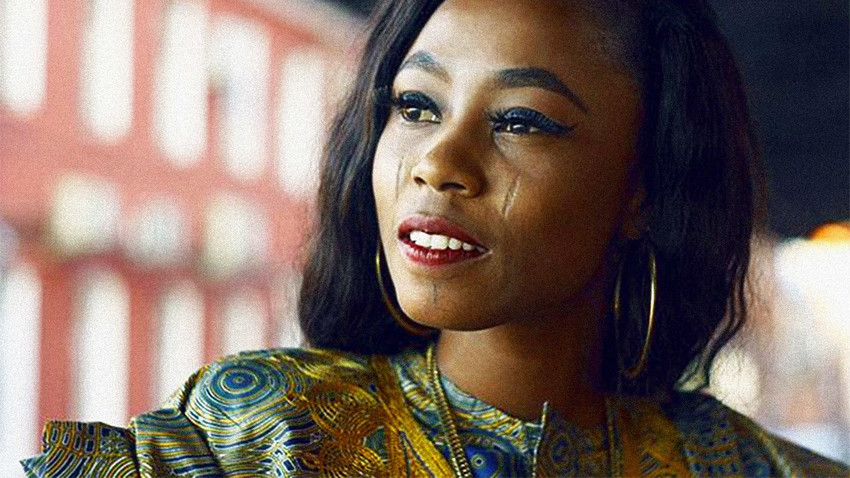
In the world at large there are 45.8m people in slavery. In the Global Slavery Index, Russia is ranked 64th. In other words, there are 5.5 "slaves" for every 1,000 citizens.
"Alternativa"She escaped from the police convoy deftly - with one powerful bound. Her rubber slippers slid off her feet and were left lying by the door outside. She ran barefoot through dark courtyards. Her "friend" did the same - she seized the moment and ran into the darkness from the police car; it all happened quickly.
Bella watches the commotion through the windshield. She was taken out of the same apartment as the "runaways." But she obediently got into the car. Because it was she who turned everyone in. She revealed the existence of the brothel with Nigerian girls where she spent more than a month in sexual slavery.
Cursed by voodoo
Southwest of Moscow, the Teply Stan district (18 km from the Kremlin). Identical high-rise buildings, deserted courtyards. One building is exactly like another. Unless you can read the street names in Russian, you will never understand where you are. On the right there’s a 24-hour store without a name and some fences; on the left there’s another 24-hour store without a name and some fences.
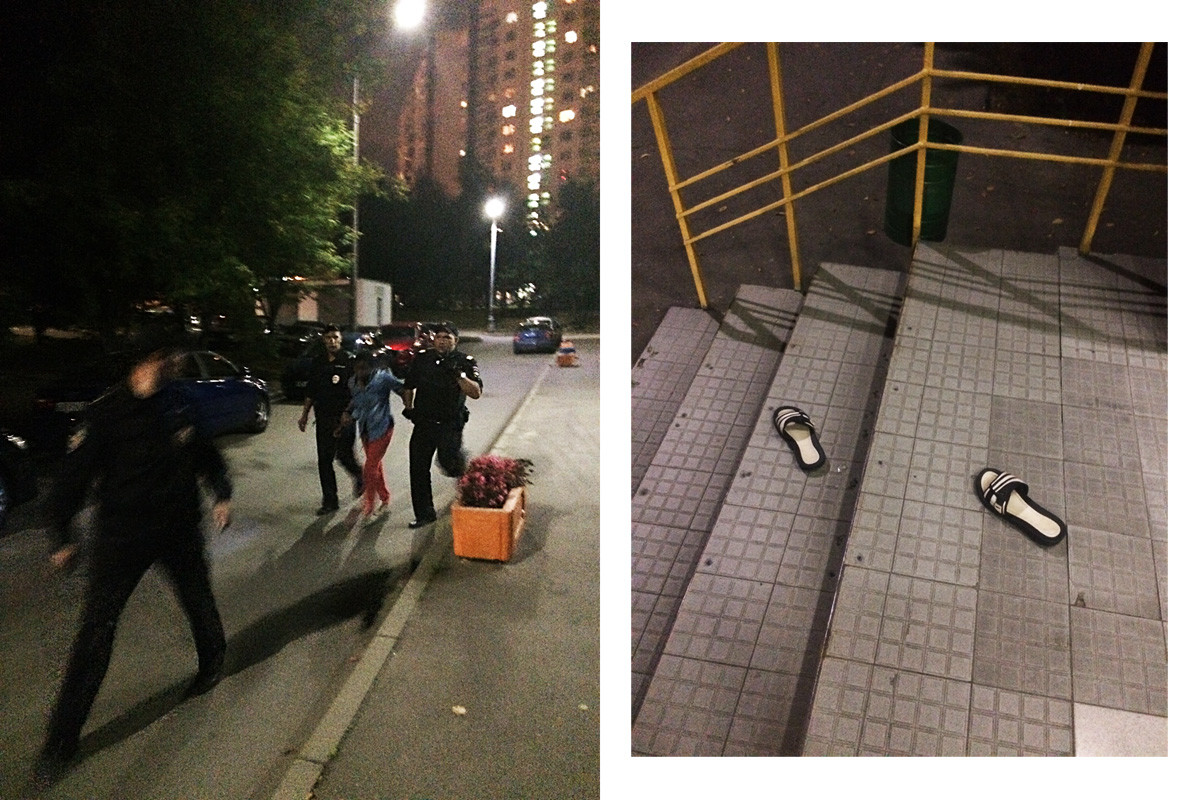
She escaped from the police convoy deftly - with one powerful bound. Her rubber slippers slid off her feet and were left lying by the door outside.
Yekaterina SinelschikovaBella and Joy - a girl from a brothel on the neighboring street - lived here. They exchanged text messages and sometimes their paths met at their working "location.”
Back in Nigeria, Bella had been offered a job in Russia. She wasn't told what the job was but was promised that "everything will be fine." She had a FAN ID document made out for her and was brought into the country during the "visa-free" during the World Cup. They say that girls were brought in using this method in "vast numbers." At a Moscow airport Bella was met by a woman who later became her madam and who took her passport. She was taken to an apartment in Teply Stan where other girls from Nigeria had already been living for more than three years. She was presented with a bill for a "debt" of $55,000 which she had to repay by working as a prostitute before she could go free. She was threatened and told she would have problems if she tried to contact the police.
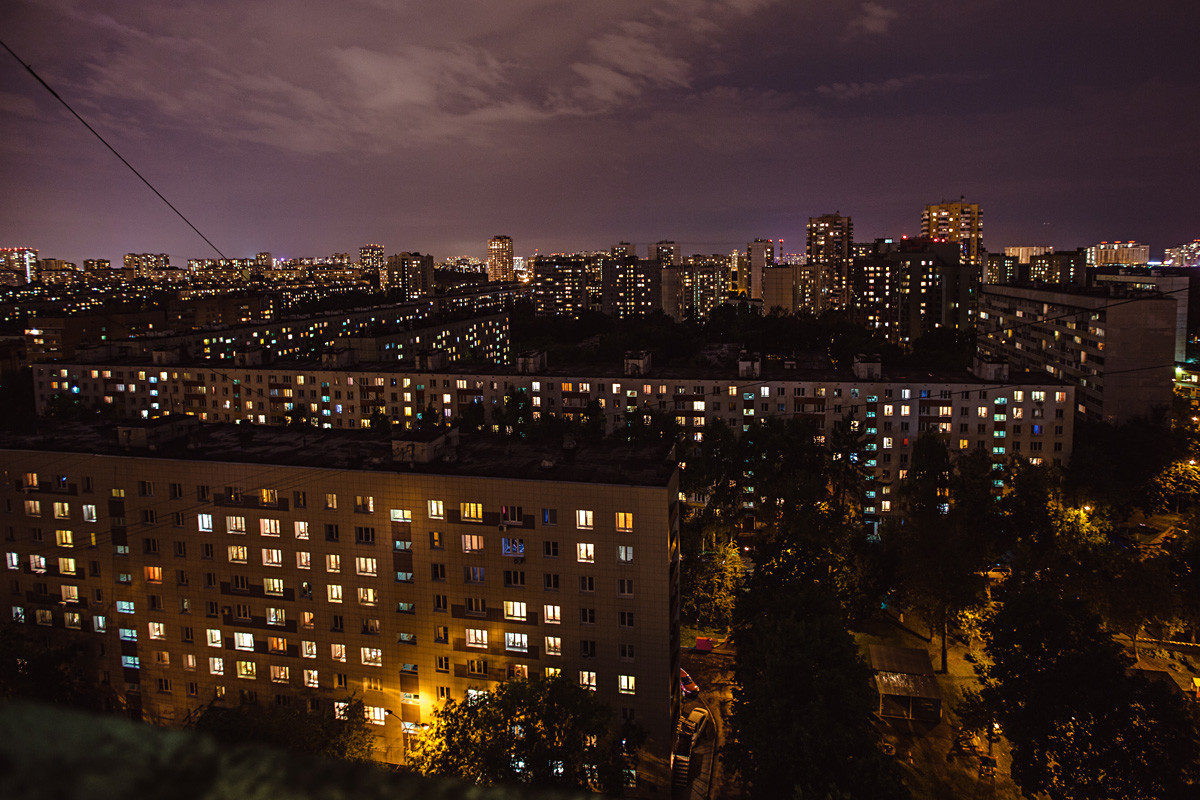
One building is exactly like another. Unless you can read the street names in Russian, you will never understand where you are.
Asya Dobrovolskaya/TASSJoy was brought in on a different pretext. In Nigeria she had attended voodoo rituals. At one of them she was "cursed." In order to have the curse lifted, she was told she had to pay. She was immediately offered the opportunity to go to Russia in order to quickly "recoup" the money.
"We brought a chicken and a pigeon. We slit their throats. We poured the blood of the chicken and pigeon into a glass and mixed it with alcohol. I drank it. Then Baba Lau said that, if I don't pay, evil will befall me," Joy says.
What happened to them next is the usual story: they were brought to Moscow and presented with the "debt" they had to repay; every day they would be taken to a "spot" by the motorway. And they were told that, if necessary, their passports would be destroyed. The madam told her: "When I first arrived in Russia, I was also afraid. But when I used to go to work, I was brave."
After that the madam told her a story about how a client wanted to throw a girl out of a window and how she jumped out of the window first out of fear. The madam’s advice was: "Stay away from windows. If God is on your side, you will be able to repay your debt quickly."
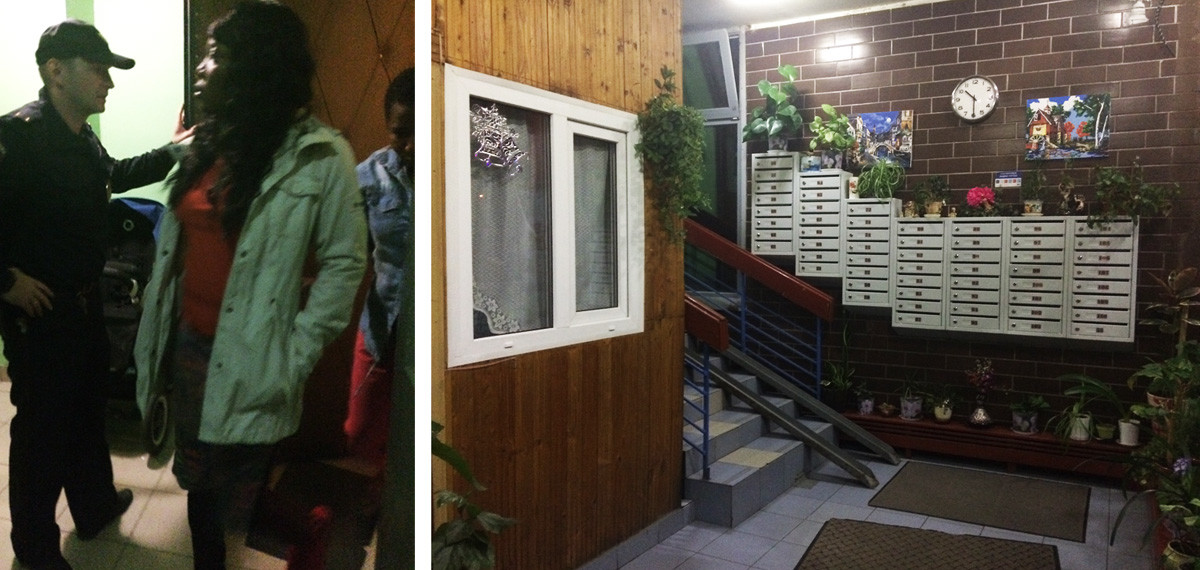
"When I first arrived in Russia, I was also afraid. But when I used to go to work, I was brave."
Yekaterina SinelschikovaAt the end of the summer Joy and Bella managed to get in touch with volunteers from Alternativa (Alternative) - a Russian organization that helps people to get out of slavery - and asked them to get them and the others out. First they freed Joy and a week later Bella.
How a person is bought
According to the Walk Free not-for-profit anti-slavery foundation, the number of people who have ended up as slaves in Russia has reached just over a million. In the world at large there are 45.8m people in slavery. In the Global Slavery Index, Russia is ranked 64th. In other words, there are 5.5 "slaves" for every 1,000 citizens. Russia doesn't keep its own statistics.
"To us it sounds silly: how could one believe in a voodoo curse? To intimidate the girls, the madams tell them that their husband is a friend of Putin. And they are believed. These girls are uneducated and don't know that, for example, a passport can be re-issued and that voodoo is nonsense," says Oleg Melnikov, head of Alternativa.
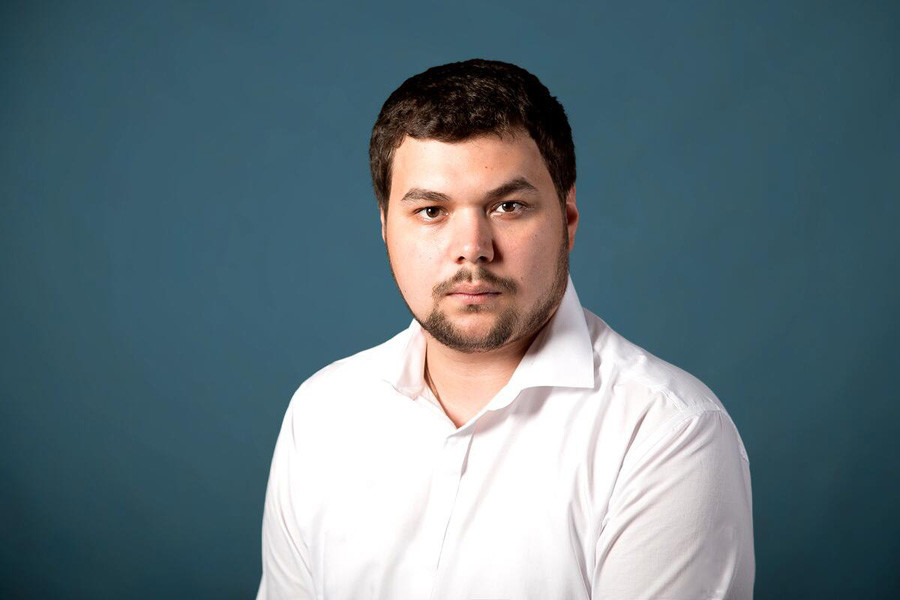
Oleg Melnikov
Personal archiveWe are sitting in a hookah cafe in central Moscow, in the Krasny Oktyabr (Red October) entertainment hub. Alternativa has its office in contemporary loft-style premises nearby. It could easily have been a design studio or an advertising agency. There is a blackboard on the wall inscribed "Sudan is ours," which means there are agreements with South Sudan to rescue people in conjunction with the local police. Alternativa is currently expanding around the world.
According to Oleg, sexual exploitation, as in the Nigerian girls' story, is only part of the slave industry. Labor slavery is more common. The criminals follow an established routine.
People from the provinces come to the big city for work. Often they don't have enough money for accommodation. For a few days they stay at the railway station, browsing ads. Then a recruiter approaches them and offers them a job "in the south." They are told that no special skills are needed and that they will be paid well.

"She was brought to Moscow, they sewed up her eyes and placed her outside Kursk railway station to beg. The more her eyes festered the more money she was given."
Nikolay Gyngazov/Global Look PressThe person agrees. The recruiter suggests that they should celebrate the "deal" and have a drink. The alcohol already contains azaleptin or clonidine. The person falls asleep for two days and wakes up somewhere at a factory in Dagestan, without a passport or telephone. The person wants to leave but is told "you have been bought. Either pay or work."
"The person thinks that he will work for a month and then they will let him go. But a month later he is told that there is a sack of cement or some sheep missing and that he also owes money for food, etc. When people try to escape, they are very often caught, beaten up, and sent back to work," says Oleg.
He quotes the going rates. A labor slave costs 25,000 rubles ($366); a girl providing sexual services 150,000-200,000 rubles ($2,200-3,000). A wheelchair user or an elderly woman are sold for 50,000 rubles ($730) and a baby for about 150,000 rubles ($2,200). The latter are needed for begging.
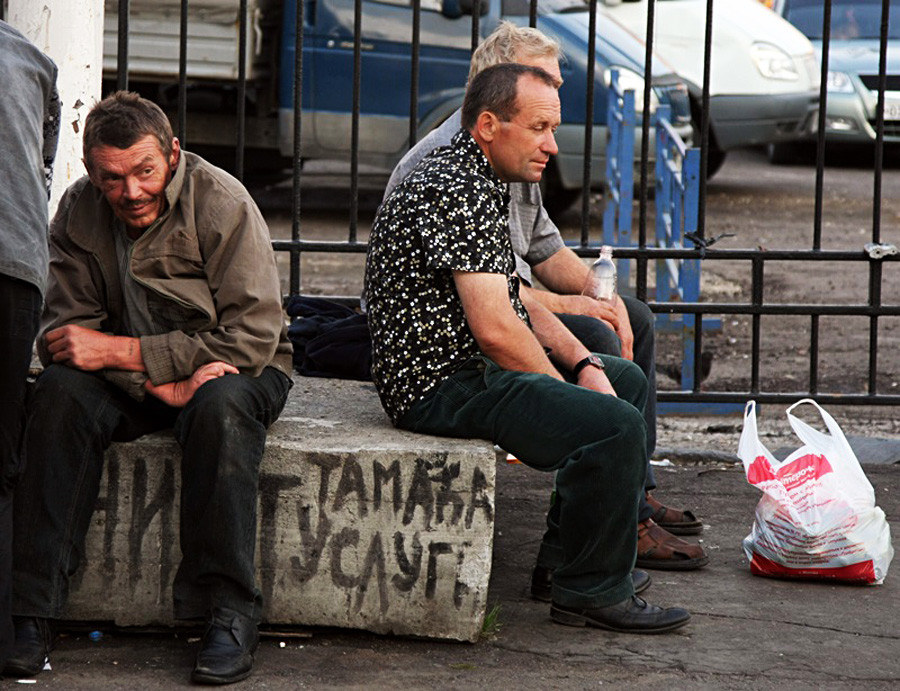
People from the provinces come to the big city for work. Often they don't have enough money for accommodation.
Kommersant"Here is a textbook case. An elderly woman lost her sight when she was young. She lived alone in Lugansk. In 2012, some people came to her and said: "In Russia there is a program for restoring eyesight and there is an opportunity to go on it," Oleg inhales his vape cigarette, then slowly breathes out and takes a sip of Fanta. "She was brought to Moscow, they sewed up her eyes and placed her outside Kursk railway station to beg. The more her eyes festered the more money she was given."
The scale of the problem
On the night of the raid on the Nigerian brothel only three people went to the police station. Bella, one of the "runaways" (the second was never caught) and a pimp - a big Nigerian man in red trousers and an acid-yellow string vest. Neighbors say he is a journalist working for one of the Moscow higher educational institutions. As it turned out, he simultaneously "deals with issues" to do with the brothel: he gives bribes, negotiates with the police, and organizes security. It emerged that other African women from the brothel had already repaid their "debt" and were engaged in prostitution voluntarily. Everyone except Bella. But nobody believes Bella. We spent three hours at the police station.
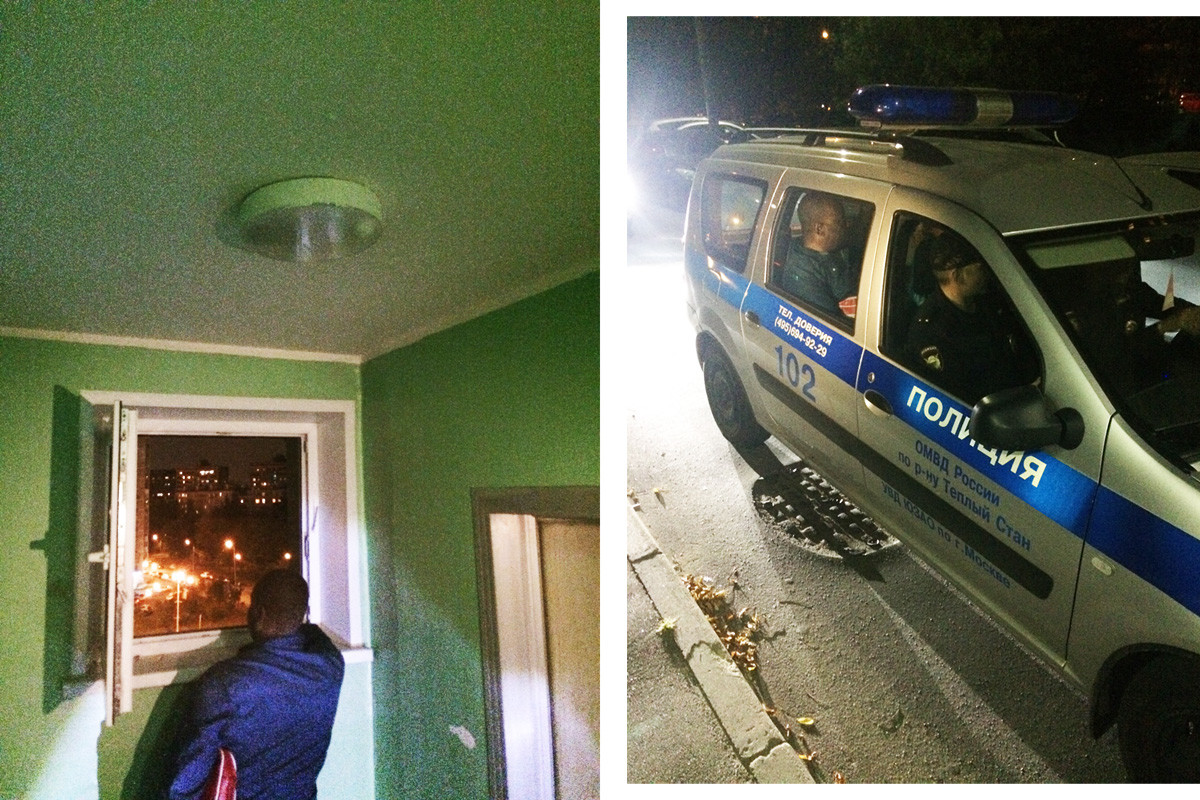
Neighbors say he is a journalist working for one of the Moscow higher educational institutions. As it turned out, he simultaneously "deals with issues" to do with the brothel.
Yekaterina SinelschikovaAccording to the activists, it depends on the district, and not all police officers are like that. Bella was simply unlucky and at some police stations people like her do get help from the police.
Activists from Grazhdanskoye Sodeistviye (Civic Assistance), another public organization, believe that Russian legislation in this sphere isn’t working. At Alternativa they call it "half-baked and not thought through."
Collecting evidence, confronting witnesses, and questioning individuals are processes that takes months.
"And when a person is taken out of captivity, what to do with them next? No one takes these people to some sort of centers where they will be looked after because there are no such centers in Russia. At best, a person goes back to where they came from. They are summoned [by the court to give evidence] but they cannot come over. And the case is closed," Melnikov laments.
Russia Beyond has had no reply to its request for comment from Russia's human rights ombudswoman Tatiana Moskalkova. The Russian Interior Ministry has also made no comment on the problem of slavery and the fight against it, and has only provided statistics on criminal cases. According to the figures, in 2017 six criminal cases were initiated throughout Russia under the article "Use of slave labor" and 21 cases for human trafficking. A total of 374 cases were investigated last year under the article "Abduction" and 458 cases under the article "Unlawful deprivation of liberty." In total, these are 859 cases that in one way or another involve the victims of modern slavery.
Strange people
A week later Joy is sitting in the backseat of a car. She’s being taken to temporary accommodation - the Nigerian community has agreed to take her in until things sort themselves out. She doesn't want to go back to Nigeria even after what has happened to her and for the fifth time asks when they will "finally" get her a microphone. Joy wants to sing, to perform in front of an audience, and she needs to practice.
After that she asks how to find a Russian husband. The female activist in the driver’s seat cuts her short: "If you want to stay in Russia, learn to survive on your own."

Joy
"Alternativa"Over the past seven years Alternativa has freed about 1,000 people. This is not much, they say. Far more people contact their hotline, but they can't help everyone. There isn't enough money - the 100,000 rubles ($1,500) a month that they manage to collect from donations is about five percent of what the group needs. Some victims need a ticket home to be bought for them, others require medical help and food. It is impossible to collect enough money from donations. Alternativa doesn't receive any state grants. Almost all the money comes from Melnikov's businesses: several enterprises and hotels, and the hookah cafe in which we are sitting.
During our conversation he makes six phone calls to acquaintances (looking for an interpreter for victims) and taps on the wooden table three times when talking of something bad (to ward off the evil eye, according to Russian superstition). Tired, he leans back on the sofa. A random chillout music compilation is playing in the background. Melnikov jokes that they are like the Sicilian Mafia - they meet all the time in the dimly-lit hookah cafe and decide whom to raid, and when.
"We are probably the strangest volunteers you have ever met, right?" he asks. And it seems he likes it - being the strangest. But he doesn't admit it. The official line is that he would love to do something else but the time is not right yet. And, frankly, "it would be a pity to give it up.”
If using any of Russia Beyond's content, partly or in full, always provide an active hyperlink to the original material.
Subscribe
to our newsletter!
Get the week's best stories straight to your inbox